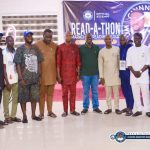Tunde Fagbenle: Reminiscences At 70 By Adefoyeke Ajao

Renowned media practitioner,Tunde Fagbenle recently hosted friends and the public to a reading from his most recent publication, And That’s Saying It the Way It Isat the Quintessence Gallery in Ikoyi.The third in a series that includes the titles, Nigeria: This Is My Country, Damn It! and Nigeria: A Thousand Laughs,A Thousand Cries, the book is a collection of the author’s columns in Nigerian newspapers between 2010 and 2016.
Fondly called TF by his friends and associates, Tunde Fagbenle was born on October 4, 1947 in Zaria and raised in Minna, Niger State even though he is originally from Igbajo in Osun State. He was educated at Kiriji Memorial College, Igbajo where he thrived as an actor and a sportsman. After his secondary education, he proceeded to the University of London and later, Johns Hopkins University in Baltimore.
The reading session was organised by Jahman Anikulapo, a culture curator and Ilemakin Soyinka, the Executive Director of the I-Represent International Documentary Film Festival, while it was moderated by the Executive Editor of The News Magazine and PM News, Kunle Ajibade. Friends such as Femi Esho, Chairman of Evergreen Music; Dotun Fagbenle, the Logunde of Igbajoland; veteran broadcaster, Dele Adetiba; thespian, Tunji Sotimirin; health practitioner, Dr. Femi Olugbile and football icon, Segun Odegbami, were in attendance, to pay homage to the media practitioner.
The author’s son, Kunle kicked off the tributes by reading a letter he had written to thank his father when he was called to the Nigerian bar. He thanked his father for his relentless efforts to attend his call-to-bar ceremony and that his presence athad made the day extra-special.
Next was Dotun Fagbenle, the Logunde of Igbajoland, who described the author as a kind-hearted and open-minded man who had always handled responsibility from a young age. He reminisced about the author’s unconventional wedding to his wife at the Bar Beach and his influence and intervention at various points in his life, including when the author gave him an amount to pay his rent “when he thought his wife would be joining him in Lagos”.
Meanwhile, thespian Tunji Shotimirin, wondered why Mr Fagbenle embraced creative writing in spite of his talent for acting. The author replied that he was a shy man who preferred the anonymity of writing to speaking. He also mentioned that writing was a better form of self-expression unlike acting which involved role playing.
According to the Chairman of Evergreen Musical Company Limited, Femi Esho (who doubles as the author’s in-law, and whose son, Tokunbo, published the collection) his first encounter with the author occurred when the latter stumbled on a tryst involving Mr Esho and his younger sister, Bolanle. Regardless of the awkwardness of their first meeting, Mr Esho explained that both men have remained inseparable and have since “done some very bad things together”.
Also speaking at the event, advertising veteran Dele Adetiba, described Mr. Fagbenle as a writer who had found a way of presenting public discourse “in a way you would appreciate and relate to”.
Mr Fagbenle emphasised the importance of research and added that it had been made much easier by access to the Internet and social media. He concluded that only a lazy writer would neglect to use such channels. This was in response to a question by Ayotunde Olowofoyeku, a representative of Senator Iyiola Omisore, on how he was able to reproduce factual accounts of past events.
Before the evening of banter, readings, recollections and tributes was brought to a close by Ilemakin Soyinka, who thanked everyone for taking the time to celebrate Mr Fagbenle, the author sharedanecdotes about his experiences as a writer, political prisoner and activist as well as his dalliance with competitive politics. The following are excerpts from the narratives that form the thrust of his newest collection of articles.
On the pleasures and pains of writing his column over the years
It has been such a journey, and in between that, I must say that I have had the temptation to stop writing. While I wasn’t a staff writer, I was freelancing, alongside running my own business and getting on with my life. But writing, obviously, took on a life of its own. I had ventured into the media, running a magazine and even starting a newspaper in England,so I’ll call myself a media entrepreneur. However, taking up the pen and writing is what I consider a natural thing.
The pleasurable part is being recognised everywhere you go, getting pointed at, with people coming to you. It has its own dangers. For example, one piece I wrote about a great boy called Faruq, whom I met at the hospital. He was a lame boy whom I had promised that I would pay a visit. He was a secondary school student, but one of my ardent readers. I promised him that I was going to visit him because it was surprising that a secondary school boy in Nigeria read my column and was bold enough to approach me to say so.
I asked where he stayed, and he said Shomolu. But the sad part was that I kept procrastinating, because each time I wanted to go toShomolu, it was either I did not have enough money or I was in a hurry. Finally, my driver and I went to Shomolu. Unfortunately, we were told that Faruq had passed away. Many of my readers wondered how I could delay my visit to the little boy and were scathing in their reproach of my procrastination.
On his release from detention by the Abacha regime, and his constant presence wherever there was picketing and protest against the regime
Leadership had become like a game of musical chairs where the military and the elite kept passing the baton. That really ticked me off and I wondered how a country could turn into a ball in the hands of such people. It was quite clear that Abacha was going to remain in power if we didn’t kick him out.
I formed the Movement for Democracy and Human Rights which was part of the effort of NADECO abroad. When Professor [Bolaji] Akinyemi came to England, my group had a demonstration at Trafalgar Square which is near the Nigerian High Commission. I think John Major was Prime Minister then. The demonstration was quite impactful because we had members of parliament and also Ben Okri– an old friend of mine – at the rally. We had hundreds of people clamouring for democracy and a free Nigeria.I knew that the Nigerian High Commission was monitoring us as we marched all the way to Downing Street.
Months later I needed to return to Nigeria, and was strangely allowed into the country. I arrived and continued writing. When I was about to leave, I was at the airport, at the final immigration check point, my luggage had already gone on the plane, but I arrested by security operatives, detainedat the airport, and later taken to their office, stripped of my clothes and kept in solitary confinement in a basement. I was quite lucky because I had friends and some family connections and it wasn’t long before I was able to get a message across to my wife. My experience in solitary confinement provoked the constant protests against Abacha’s regime.
On his failed attempt to become a senatorand his campaign for ethical reorientation
It is necessary for all those interested in nation building to get involved at a practical level, and that was what contributed to my quest to run for political office as a senator in 2003.
The Nigerian Constitution did not accommodate independent candidature, which I would have really loved to explore. However, I joined Chief Gani Fawehinmi’s National Conscience Party because it was as good as running on your own. There was no structure and you were responsible for your campaign. I went to every village in my senatorial district. My Yoruba became so clear and I even became fluent in the local dialect. I would get home and look at myself in the mirror and wonder if I was the one who did all that.
I gotto go round, and encountered 8 to 9 year olds who asked for bribes and I would go back to ask their parents if the heard their children demanding bribes. It was a great experience because you get to meet all sorts of people and get involved.
How that experience influenced his commitment to radical change
I thought deeply about what ailed society and I reached the conclusion that it was a fundamental problem with our values and maybe we should start inculcating the right values in the youth and our children over time. It’s not going to be a radical transformation, but until we begin to get our values right, we won’t develop as a nation.
There are various core values that can be shared amongst different ethnic groups. At my daughters’ school in the US, students would be expelled if they were caught doing two things – tardiness and lying. I think Americans have successfully reduced the totality of all values to those two bad things. If you think deeply, you can reduce the problem with our country to those two things: politicians keep us waiting for hours and show up without apologising.
A sense of time is essential, if we are to achieve our goals as a nation. Preaching the right values and encouraging the youth to practise them is a cause very close to my heart.
On how his childhood in Minna helped to nurture his cosmopolitan outlook
There’s no running away from one’s upbringing and associations particularly from childhood;that and also boarding school. The Nigeria I grew up in did not see one tribe above the other – Igbo, Yoruba and Hausa were considered equal. I have observed this trend amongst my peers, but I am not sure I can say the same for those who came after us. You can’t spend four years in boarding school and take lying lightly, with the kind of friendships we made in those days…
Nigeria has reached a sad point, now, where no matter how brilliant or successful you are, you will see friends or followers responding to friends about people from an ethnic group, thosewho unite to threaten members of another ethnic group or those who are putting one ethnic group above the other.
I know that being born in the North, growing up in the North and living amongst different people (in different countries) for most of my adult life has played a very big part in forming my outlook.
On his hitherto unrevealed efforts to contribute to Professor Chinua Achebe’s medical expenses…
Professor Achebe was not flown out immediately after his accident, everything was hushed and nobody knew where he was. MKO Abiola got wind of the campaign and called me to his house. Those were the type of things that got MKO concerned because he was such a kind-hearted human being.
He put some money in an envelope and instructed me to find out where he had been taken to and hand it over. I was able to locate his wife and I handed over the money to her. Such gestures were part of MKO’s contributions to humanity.









